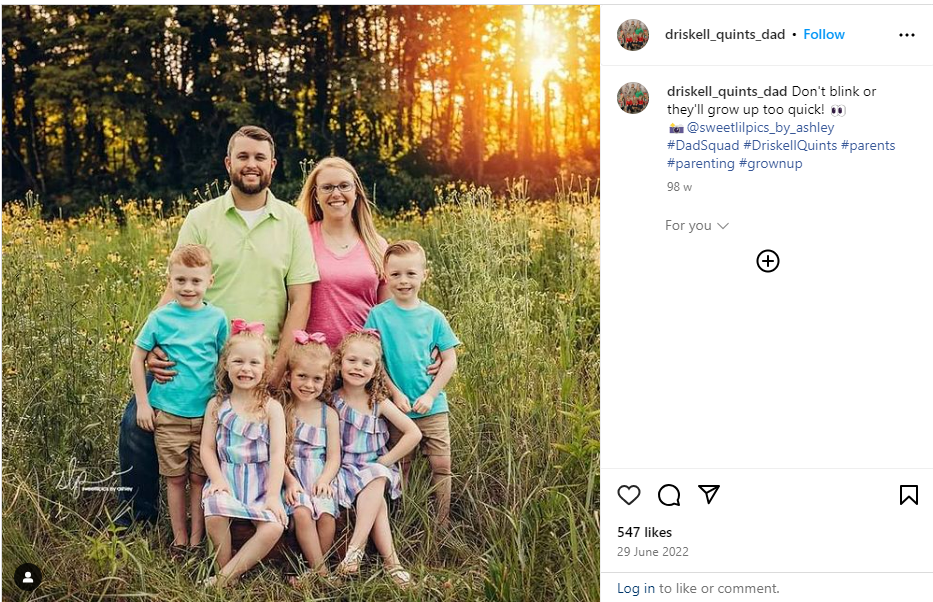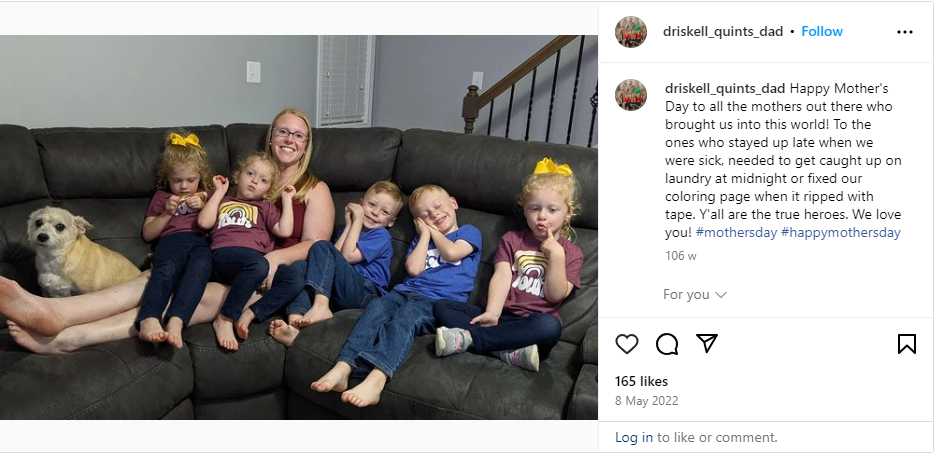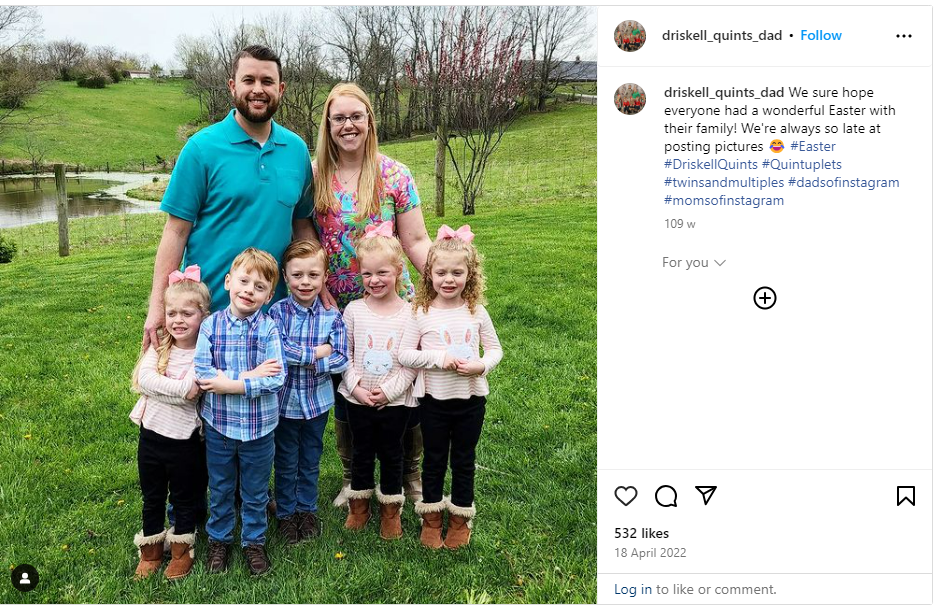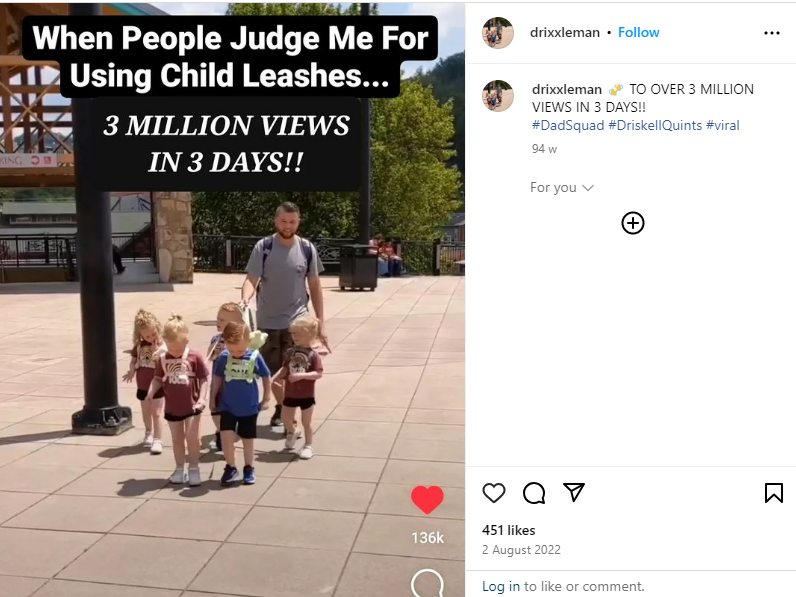Dad gets massively shamed for putting leashes on his 5-year-old quintuplets
In the labyrinth of modern parenthood, navigating through the cacophony of opinions is but the tip of the iceberg. Jordan Driskell, a figure cloaked in the enigma of youth, finds himself at the helm of a familial odyssey unlike any other. Blessed—or perhaps challenged—by the fates with quintuplets, five tender souls tethered to him by blood, yet each a universe unto themselves.
Picture, if you will, a tableau of chaos and wonder: five kindred spirits, each but a budding sapling in the sprawling forest of life, all reaching for the stars in their own unique way. Yet, within this kaleidoscope of innocence and curiosity lies a challenge of Herculean proportions, for to shepherd five young souls through the tumultuous seas of childhood is to dance upon the razor’s edge of exhaustion and exhilaration.
Every day dawns anew for Jordan, a symphony of laughter and tears, of triumphs and tribulations. The world, ever eager to offer its unsolicited counsel, adds another layer of complexity to his already labyrinthine journey. From the sage whispers of family elders to the cacophonous chorus of digital denizens, each voice vying for recognition in the grand tapestry of parenthood.
And so, Jordan Driskell, the intrepid voyager, finds himself cast adrift in the boundless expanse of fatherhood, his quintuplets the North Star guiding him through the turbulent seas of uncertainty. For in the crucible of chaos, amidst the ceaseless symphony of childhood, lies the essence of his adventure—a narrative woven with threads of love, perseverance, and the indomitable spirit of familial bond.

Amidst the tempest of parenthood, Jordan Driskell, a mere mortal navigating the tumultuous seas of fatherhood, found himself faced with a quandary of epic proportions. How does one corral a brood of rambunctious youngsters, each a whirlwind of energy and curiosity, while traversing the urban jungle?
Enter Driskell, a modern-day alchemist, wielding not potions but innovative solutions forged in the fires of necessity. With the deft stroke of a credit card, he acquired a set of leashes, not for hounds but for his spirited progeny. A daring gambit, some might say, but one born of a father’s fierce determination to ensure the safety and sanity of his brood.
Gone were the days of the cumbersome six-seat stroller, a relic of past trials and tribulations. Its unwieldy bulk now relegated to the annals of history, replaced by a more agile and adaptable solution. For Driskell, it wasn’t merely about convenience, but about fostering a sense of independence and exploration in his young charges.
No longer confined to the confines of a stroller, the quintuplets roamed free, tethered to their father by slender cords of safety. Their laughter echoed through the streets, a symphony of joy and discovery, as they ventured forth into the great unknown. And amidst this chaos, amidst the cacophony of city life, Jordan Driskell stood tall, a beacon of ingenuity and devotion, guiding his brood through the labyrinthine streets with a steady hand and a heart full of love.

In the annals of social media lore, Jordan Driskell unwittingly stumbled upon a viral phenomenon that would ignite a firestorm of controversy and condemnation. The innocuous video of a family outing to the aquarium, a tender moment frozen in time, became the epicenter of a digital tempest that swept across the virtual landscape with the force of a hurricane.
At the heart of the maelstrom lay a simple act of parental ingenuity: the use of leashes to corral a brood of exuberant youngsters. Yet, what began as a practical solution to the age-old challenge of wrangling young children in public spaces quickly morphed into a battleground of moral indignation and judgment.
As the video garnered millions of views, the comment section became a battlefield, littered with the verbal shrapnel of outraged netizens. Accusations flew like arrows, piercing the armor of parental resolve with chilling precision. “Children are not animals,” they cried, their voices rising in unison against the perceived affront to human dignity.
But amidst the cacophony of condemnation, there lurked a darker undercurrent of disdain and derision. “If you can’t manage the pressure, don’t have so many kids,” they sneered, their words dripping with contempt for Driskell and his kin. Others, cloaked in the guise of helpful advice, offered thinly veiled insults disguised as wisdom. “Can’t you just properly train your children?” they scoffed, their condescension veiled behind a facade of concern.
Yet, amidst the torrent of negativity, there were whispers of support, faint but steadfast, like beacons of light in a sea of darkness. For every voice raised in anger, there were those who stood in solidarity with Driskell, recognizing the inherent challenges of parenting in a world fraught with judgment and scrutiny.
And so, as the dust settled and the echoes of dissent faded into the ether, Jordan Driskell stood firm, a bastion of resilience in the face of adversity. For in the crucible of controversy, amidst the swirling vortex of public opinion, he found solace in the unwavering love and devotion of his family, a bond forged in the fires of shared experience and unyielding determination.

In the swirling sea of public opinion, amidst the tumult of conflicting viewpoints, emerged the voice of reason in the form of Dr. Deborah Gilboa, a beacon of wisdom in the realm of parenting and adolescent development. With the clarity of a seasoned navigator, she charted a course through the stormy waters of controversy, offering insight and perspective to those willing to listen.
Contrary to the chorus of condemnation, Dr. Gilboa challenged the notion that leashes equate to dehumanization, offering a refreshing perspective on their utility as a practical tool for managing young children in public spaces. With a deft touch, she dismantled the stigma surrounding the use of leashes, recognizing them not as symbols of subjugation, but as instruments of empowerment for children of all abilities.
Drawing upon her vast expertise, Dr. Gilboa underscored the importance of context, acknowledging that for some families, the choice between staying home or venturing out with the aid of a leash is a stark reality. In such cases, she affirmed, the leash becomes not just a convenience, but a lifeline to the outside world—a gateway to exploration and socialization for children and parents alike.
Yet, even as she championed the merits of leashes as a valuable tool for younger or neurodiverse children, Dr. Gilboa sounded a note of caution. For children deemed neurotypical, she emphasized the importance of gradually transitioning away from reliance on physical constraints, urging parents to nurture the development of listening skills and verbal communication as their offspring matured.
In her vision of parenting, the leash was but a temporary crutch, a means to an end rather than an end in itself. By the age of eight or nine, she suggested, children should ideally have outgrown the need for such physical restraints, having honed their ability to engage in meaningful dialogue with their caregivers.
In the end, Dr. Gilboa’s message resonated not just as a prescription for effective parenting, but as a testament to the power of understanding and adaptability in the face of societal norms and expectations. In her words, the leash was not a symbol of failure, but a stepping stone on the path to autonomy and mutual respect between parent and child.

Absolutely, parenting is a deeply personal journey, and every family faces unique challenges and circumstances. It’s essential to cultivate a culture of empathy and understanding, recognizing that there is no one-size-fits-all approach to raising children.
As for the topic of children on leashes in public, it’s a complex issue with valid perspectives on both sides. Some parents may find leashes to be a practical solution for managing young children in crowded or unfamiliar environments, while others may have ethical concerns about the implications for a child’s autonomy and self-esteem.
Ultimately, it’s crucial to approach the topic with an open mind and a willingness to engage in constructive dialogue. By sharing our thoughts and experiences respectfully, we can foster a more inclusive and supportive community where all parents feel empowered to make the choices that are best for their families. So, I encourage everyone to join the conversation and share their perspectives in the comments below. Let’s learn from each other and support one another on this journey called parenthood.



